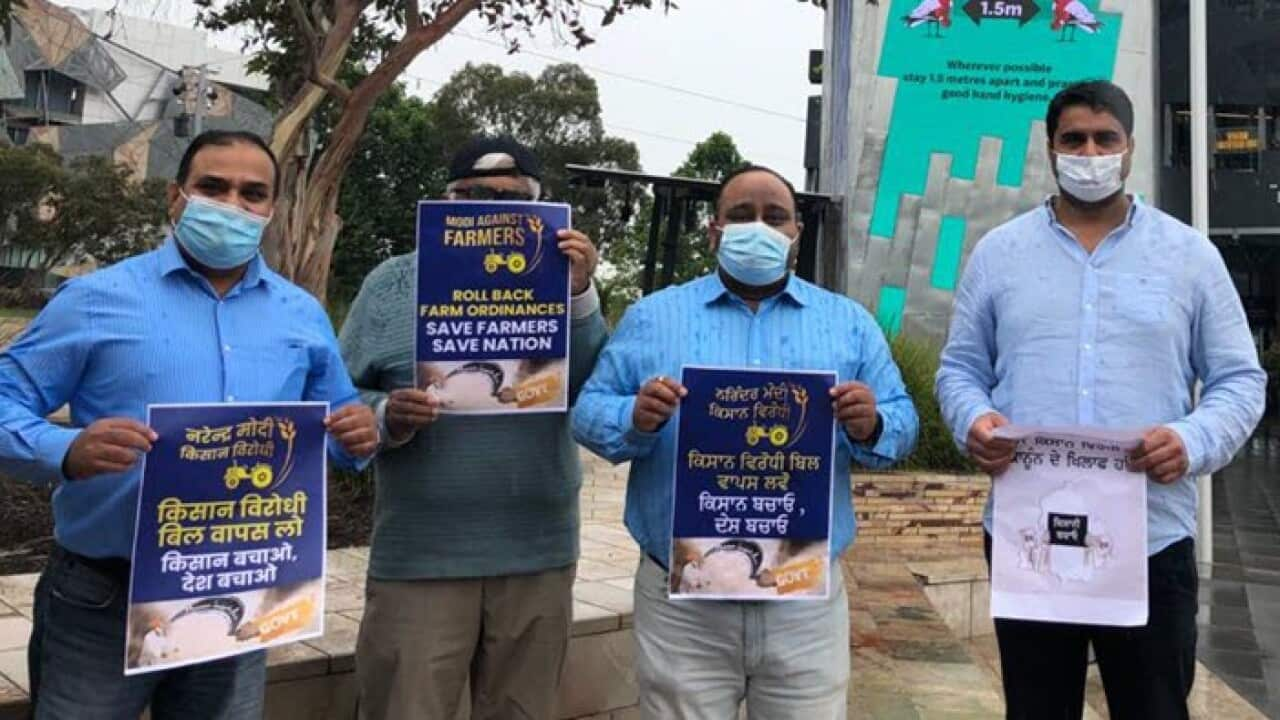Highlights
- A group of Indian-Australians protests against the new farm bills to support Indian farmers in Melbourne
- These bills will exploit the vulnerability of small farmers, claim protestors
- The protestors demanded the withdrawal of the three recently enacted legislations in India
In response to a protest call issued by the Alliance for Farmers and Workers Rights in India (AWFRI), a small group of members of the Indian diaspora supported by newly-launched ‘The Humanism Project’ gathered at Federation Square yesterday.
The group which refrained from gathering in a large number due to COVID-induced restrictions raised slogans in support of the Indian farmers, calling upon the Modi government to roll back the three farm reform bills which the protestors claim is against the interests of the agrarian community, leaving them without a financial safety net.
‘These bills will exploit the vulnerability of small farmers’

Members of the Indian community raise slogans against the recently enacted Indian Farm Bills in Melbourne. Source: Supplied by Deepak Joshi
Aftab Mohammad, the president of the Bihar and Uttar Pradesh chapter of the Indian Overseas Congress told SBS Punjabi that their primary concern is that the three bills leave the farmers without any protection and open them to exploitation by big businesses.
“There are a lot of pitfalls in the three bills - let’s first talk about the Essential Commodities bill, we fear that this law will allow big businesses to stock and hoard commodities which in turn will inflate the prices of the commodities, thereby affecting poor farmers who do not have the means and resources to stock.
“Then there is contract farming which will allow farmers to enter into written contracts with firms for future produce. Now in the prospect that a company fails to purchase the produce due to any reason, the bill fails to protect the interest of the vulnerable farmers,” said Mr Mohammad.
‘No safety net for the farmers’
Another protestor, who doesn't wish to be named added that a major concern for farmers and those opposing these bills is that the Farmers’ Produce Trade and Commerce -one of the new legislation paves the way for dismantling the Agriculture Produce Marketing Committee (APMC) structure which allowed farmers to sell their produce at government-regulated markets, or mandis at a Minimum Support Price (MSP).
“Now this bill will not only abolish the middlemen who earlier helped growers to sell their harvests at a regulated price but will also leave them without the safety net of the MSP leaving the control in the hands of rich traders without any protection for small farmers,” he said.
The protests against the farming Bills have been strongest in the north Indian state of Punjab - a largely agrarian state that boasts of a large diaspora in countries across the globe, including the UK, US and Canada which have witnessed similar protests seeking withdrawal of the bills.
These protests are building momentum ahead of the ‘Delhi Chalo’ protest being organised by Indian farmers’ organisations calling out farmers from around the country to march to the national capital on November 26-27 to press the government to scrap the amendments.
But what are the three reformed farm bills?
The Farmers’ Produce Trade and Commerce (Promotion and Facilitation), the Farmers (Empowerment and Protection) Agreement of Price Assurance and Farm Services and the Essential Commodities (Amendment) Act became laws after they were signed by President Ram Nath Kovind.
- The Farmers’ Produce Trade and Commerce (Promotion and Facilitation) bill seeks to allow farmers to sell their produce outside APMC 'mandis' and enable food traders to buy farmers’ produce from any market.
- Farmers (Empowerment and Protection) Agreement of Price Assurance and Farm Services bill will allow farmers to enter into a contract with agri-business firms or large retailers for the sale of future farming produce at a mutually pre-agreed price of their produce.
- The Essential Commodities (Amendment) Bill, 2020, seeks to remove commodities like cereals, pulses, oilseeds, edible oils, onion and potatoes from the list of essential commodities. However, the central government has retained the right to regulate them under extraordinary circumstances.

Prime Minister Narendra Modi/Bhartiya Kisan Union Ekta (Sidhupur) members raise slogans during a protest against farm bills Source: AAP
The government claims it would also enable them to sell their harvest to private players outside the mandis at the same time allowing them to negotiate their own prices.
Defending the move in a Twitter post, Prime Minister Narendra Modi wrote that “For decades, the Indian farmer was bound by various constraints and bullied by middlemen. The bills passed by Parliament liberate the farmers from such adversities.”





